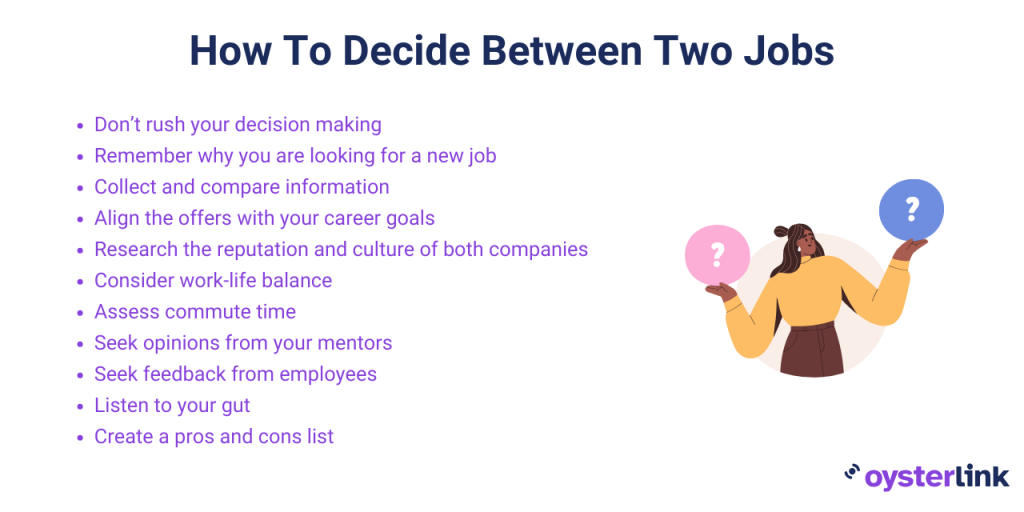Receiving two job offers is always worth celebrating, as it means you are an attractive candidate to multiple employers. However, it also presents a new challenge:
How do you decide between two jobs?
In this article, we’ve listed valuable tips that will help you evaluate and decide which job offer to accept.
11 Tips on How To Decide Between Two Jobs in 2024
From negotiating timelines to trusting your instincts, here are the best tips that can help you make the right decision.

1. Don’t Rush Your Decision Making
Remember that you don’t have to provide an answer immediately.
Employers appreciate candidates who make informed choices, so don’t hesitate to ask for the time you need to make the best decision.
You can either provide a definite time (e.g., stating you will answer in 24 hours) or ask the hiring manager when is the latest you can get back to them.
Extra time allows you to evaluate each offer, consider the pros and cons and seek additional information, if needed.
2. Remember Why You Are Looking for a New Job
Think about the reasons that made you seek new job opportunities, whether it’s career advancement, a more supportive work environment or a switch from on-site to remote work.
Consider how each of the offers addresses these concerns and assess if the new prospects provide better options.
3. Collect and Compare Information
Gather information about each job, including responsibilities, benefits, salary and organizational structure. Review the job descriptions and contact the hiring managers if you need further clarification.
Make sure you understand the benefits and compensation packages offered by each company. Compare salary structures, healthcare plans, retirement benefits and other incentives.
4. Align the Offers With Your Career Goals
Evaluate how each job offer aligns with your long-term career goals. Consider the skills you want to develop, the type of work that excites you and the level of responsibility you would like to take.
Assess the potential for development and career advancement. Evaluate the learning opportunities provided by each employer, such as training programs, mentorship opportunities and other resources that can contribute to your professional growth.
Identify your non-negotiable factors, such as specific types of projects, leadership opportunities or aspects of the work culture. Alternatively, your non-negotiables could also be certain tasks in the offer that you would rather avoid.
5. Research the Reputation and Culture of Both Companies
Find more about the reputation of your potential employers. Begin by visiting the official websites of both companies. Look for mission statements, values and information about their commitment to employees.
Research any industry awards, recognitions or certifications received. These might include: the AAA Five Diamond Award, which signifies the highest level of luxury and service in the hospitality industry and The World’s 50 Best Restaurants, which features outstanding restaurants worldwide and more.
Awards for workplace culture, diversity and inclusion are another sign of a positive reputation in the industry.
You can also read employee reviews on platforms such as Glassdoor and Indeed. Pay attention to recurring points in both positive and negative reviews.
6. Consider Work-Life Balance
Make sure that the job you choose supports a healthy balance between work and personal life.
Evaluate the expected workload and work hours for each job offer. Analyze the company’s policies on flexible working time and overtime pay. These will help you see how each position aligns with your personal lifestyle and other priorities.
You should also assess the work-life balance initiatives and benefits offered by each company. These can include wellness programs, mental health support and paid time off.
7. Assess Commute Time
Commute time directly impacts your daily routine and overall job satisfaction. Consider the distance and transportation options for each position and calculate the estimated commute times.
Opt for a job with a more manageable commute, as it not only reduces stress but also allows for a better work-life balance and optimized job experience.
8. Seek Feedback From Employees
Employee perspectives can provide firsthand information on the positions you are considering.
Reach out to current or former employees to collect insights on their experiences. Use social media and professional networking sites to connect and initiate conversations.
Get their feedback on the workplace culture, management style and common challenges they faced in their work.
Additionally, ask about any considerations that can help you choose between the job offers, such as track record and stability.
9. Seek Opinions From Your Mentors
Talk to mentors and knowledgeable peers who have experience in your industry or line of work.
Make sure you outline your situation and share the details of each job offer. Explain why you are facing a dilemma and how each job aligns with your long-term goals.
10. Listen to Your Gut
Trusting your instincts can help you assess whether a particular job opportunity feels right for you. Pay attention to your feelings and the overall vibe you get from each company.
If one of the job offers doesn’t resonate with you, prioritize the option that feels right for your career journey.
11. Create a Pros and Cons List
Start by listing the positive aspects of each job offer. These could be job responsibilities you look forward to, opportunities for growth or specific benefits.
Then, list the potential drawbacks of each offer. These can include lower salary, limited benefits and concerns about company culture.
Use your pros and cons list to better compare the two offers and identify which one meets more of your priorities and preferences.
FAQs About Multiple Job Offers
Still looking for answers about deciding between multiple job offers? Check out the most asked questions below for additional insights and guidance.
Is it acceptable to negotiate aspects of each job offer?
Yes, it’s acceptable to negotiate aspects of each job offer that are important to you. These can include salary, benefits, work hours or any other terms.
Make sure to approach negotiations politely and professionally.
Should I prioritize salary over other benefits when comparing job offers?
While salary is important, it shouldn’t be your sole consideration. Make sure to assess the entire compensation package, including benefits, bonuses and potential for growth.
What should I do if the offered salary is below my expectations?
If the salary offered (whether for one offer or both) is below your expectations, consider negotiating. During the negotiation process, make sure to highlight your skills and the value you bring to the role.
Stay Ahead in Your Career Journey With OysterLink
Whether you’re navigating the complex job market or preparing for interviews, we provide a wealth of information to guide you at every step, from detailed job descriptions to salary trends and more.
If you are facing the decision between two job offers, our resources will help you make well-informed career choices. From negotiating timelines to considering benefits beyond salary, our insights support you at every step.
Once you have made up your mind, you will need to inform the two companies of your decision. We have you covered – check out our tips on accepting a job offer or declining it.
Explore our platform, where your career journey begins with the right information at your fingertips.









